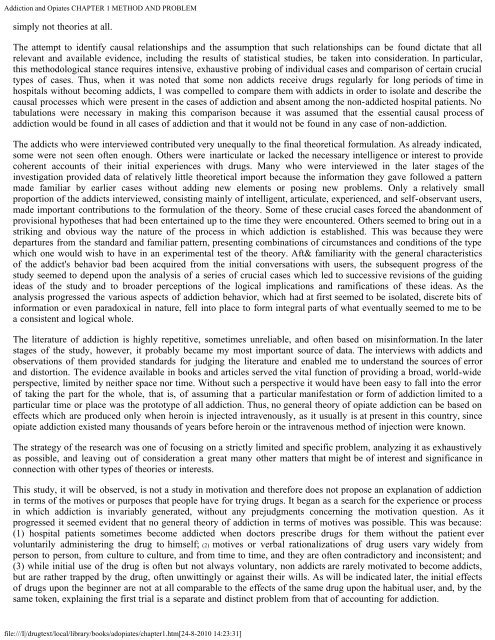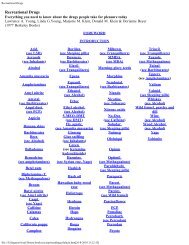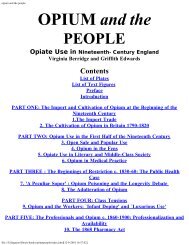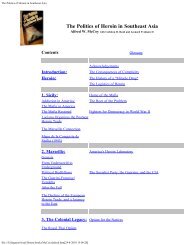Addiction and Opiates
Addiction and Opiates
Addiction and Opiates
You also want an ePaper? Increase the reach of your titles
YUMPU automatically turns print PDFs into web optimized ePapers that Google loves.
<strong>Addiction</strong> <strong>and</strong> <strong>Opiates</strong> CHAPTER 1 METHOD AND PROBLEM<br />
simply not theories at all.<br />
The attempt to identify causal relationships <strong>and</strong> the assumption that such relationships can be found dictate that all<br />
relevant <strong>and</strong> available evidence, including the results of statistical studies, be taken into consideration. In particular,<br />
this methodological stance requires intensive, exhaustive probing of individual cases <strong>and</strong> comparison of certain crucial<br />
types of cases. Thus, when it was noted that some non addicts receive drugs regularly for long periods of time in<br />
hospitals without becoming addicts, I was compelled to compare them with addicts in order to isolate <strong>and</strong> describe the<br />
causal processes which were present in the cases of addiction <strong>and</strong> absent among the non-addicted hospital patients. No<br />
tabulations were necessary in making this comparison because it was assumed that the essential causal process of<br />
addiction would be found in all cases of addiction <strong>and</strong> that it would not be found in any case of non-addiction.<br />
The addicts who were interviewed contributed very unequally to the final theoretical formulation. As already indicated,<br />
some were not seen often enough. Others were inarticulate or lacked the necessary intelligence or interest to provide<br />
coherent accounts of their initial experiences with drugs. Many who were interviewed in the later stages of the<br />
investigation provided data of relatively little theoretical import because the information they gave followed a pattern<br />
made familiar by earlier cases without adding new elements or posing new problems. Only a relatively small<br />
proportion of the addicts interviewed, consisting mainly of intelligent, articulate, experienced, <strong>and</strong> self-observant users,<br />
made important contributions to the formulation of the theory. Some of these crucial cases forced the ab<strong>and</strong>onment of<br />
provisional hypotheses that had been entertained up to the time they were encountered. Others seemed to bring out in a<br />
striking <strong>and</strong> obvious way the nature of the process in which addiction is established. This was because they were<br />
departures from the st<strong>and</strong>ard <strong>and</strong> familiar pattern, presenting combinations of circumstances <strong>and</strong> conditions of the type<br />
which one would wish to have in an experimental test of the theory. Aft& familiarity with the general characteristics<br />
of the addict's behavior bad been acquired from the initial conversations with users, the subsequent progress of the<br />
study seemed to depend upon the analysis of a series of crucial cases which led to successive revisions of the guiding<br />
ideas of the study <strong>and</strong> to broader perceptions of the logical implications <strong>and</strong> ramifications of these ideas. As the<br />
analysis progressed the various aspects of addiction behavior, which had at first seemed to be isolated, discrete bits of<br />
information or even paradoxical in nature, fell into place to form integral parts of what eventually seemed to me to be<br />
a consistent <strong>and</strong> logical whole.<br />
The literature of addiction is highly repetitive, sometimes unreliable, <strong>and</strong> often based on misinformation. In the later<br />
stages of the study, however, it probably became my most important source of data. The interviews with addicts <strong>and</strong><br />
observations of them provided st<strong>and</strong>ards for judging the literature <strong>and</strong> enabled me to underst<strong>and</strong> the sources of error<br />
<strong>and</strong> distortion. The evidence available in books <strong>and</strong> articles served the vital function of providing a broad, world-wide<br />
perspective, limited by neither space nor time. Without such a perspective it would have been easy to fall into the error<br />
of taking the part for the whole, that is, of assuming that a particular manifestation or form of addiction limited to a<br />
particular time or place was the prototype of all addiction. Thus, no general theory of opiate addiction can be based on<br />
effects which are produced only when heroin is injected intravenously, as it usually is at present in this country, since<br />
opiate addiction existed many thous<strong>and</strong>s of years before heroin or the intravenous method of injection were known.<br />
The strategy of the research was one of focusing on a strictly limited <strong>and</strong> specific problem, analyzing it as exhaustively<br />
as possible, <strong>and</strong> leaving out of consideration a great many other matters that might be of interest <strong>and</strong> significance in<br />
connection with other types of theories or interests.<br />
This study, it will be observed, is not a study in motivation <strong>and</strong> therefore does not propose an explanation of addiction<br />
in terms of the motives or purposes that people have for trying drugs. It began as a search for the experience or process<br />
in which addiction is invariably generated, without any prejudgments concerning the motivation question. As it<br />
progressed it seemed evident that no general theory of addiction in terms of motives was possible. This was because:<br />
(1) hospital patients sometimes become addicted when doctors prescribe drugs for them without the patient ever<br />
voluntarily administering the drug to himself; (2) motives or verbal rationalizations of drug users vary widely from<br />
person to person, from culture to culture, <strong>and</strong> from time to time, <strong>and</strong> they are often contradictory <strong>and</strong> inconsistent; <strong>and</strong><br />
(3) while initial use of the drug is often but not always voluntary, non addicts are rarely motivated to become addicts,<br />
but are rather trapped by the drug, often unwittingly or against their wills. As will be indicated later, the initial effects<br />
of drugs upon the beginner are not at all comparable to the effects of the same drug upon the habitual user, <strong>and</strong>, by the<br />
same token, explaining the first trial is a separate <strong>and</strong> distinct problem from that of accounting for addiction.<br />
file:///I|/drugtext/local/library/books/adopiates/chapter1.htm[24-8-2010 14:23:31]





